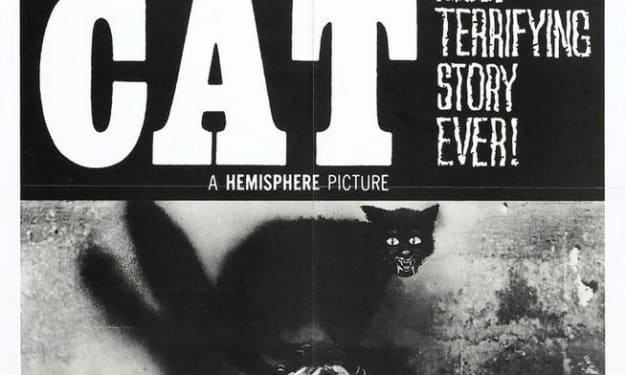
Ligiea is a fantom woman, a fantasy; a reanimated spirit, reincarnate to torment the opium-addled Unnamed Narrator with the supernal vision of perfect love. She is exceptional in every way; her voice, "low and musical," her forehead and pallor pale and pretty as porcelain, a nose of aquiline and delicate proportions, the likes of which the Unnamed Narrator has seen "only among the Hebrews." Even her reading and her studies are beyond what one would expect of a woman of the era.
We suspect that she exists for him only as a daydream, a mirage; he says he "must have met her in an ancient city," and that he, curiously, "never knew her paternal name." At any rate, she still became his "boon companion[...]the wife of my bosom"-- Her tall, nearly emaciated form suggests that she is touched, as in his mind, by the tendril, spectral finger of incipient doom. He describes the vast plane of her transcendental knowledge as if he were giving a reader a summation of the delicacy of her breast--confusing his lust for knowledge and his adoration of her mind with his own wanton lust.
What secrets could that low, melodious voice whisper into his ear? Did she know the secrets of the tomb? As the Death Angel, with icy fingers of solid white, reaches up to paint the sepulchral blush, the "livid hue" upon her cheek, what did she know of the yawning chasm of the tomb that opened up beneath her delicate, oh-so-delicate feet?
There is a suggestion in the lines she scrawled, in an intense spasm of literary creation, right before she was set free from this veil of tears. And such a veil she must have thought it, for she wrote--
Lo! ’t is a gala night
Within the lonesome latter years!
An angel throng, bewinged, bedight
In veils, and drowned in tears,
Sit in a theatre, to see
A play of hopes and fears,
While the orchestra breathes fitfully
The music of the spheres.
Mimes, in the form of God on high,
Mutter and mumble low,
And hither and thither fly—
Mere puppets they, who come and go
At bidding of vast formless things
That shift the scenery to and fro,
Flapping from out their Condor wings
Invisible Wo!
That motley drama—oh, be sure
It shall not be forgot!
With its Phantom chased for evermore
By a crowd that seize it not,
Through a circle that ever returneth in
To the self-same spot,
And much of Madness, and more of Sin,
And Horror the soul of the plot.
But see, amid the mimic rout,
A crawling shape intrude!
A blood-red thing that writhes from out
The scenic solitude!
It writhes!—it writhes!—with mortal pangs
The mimes become its food,
And seraphs sob at vermin fangs
In human gore imbued.
Out—out are the lights—out all!
And, over each quivering form,
The curtain, a funeral pall,
Comes down with the rush of a storm,
While the angels, all pallid and wan,
Uprising, unveiling, affirm
That the play is the tragedy, “Man,”
And its hero, the Conqueror Worm.
This is Poe's own "The Conqueror Worm," but it evinces the futility of our earthly existence, the "worm" conquering the mimes, who "become its food." The dumb show mummery they transpire to put upon the stage is simply a farcical theater act. Heaven watches in diaphanous veils, weeping from the theater box above. "Vast form that move the scenery to and fro"--in other words, the inscrutable nature of events that bless one man with life, and curse another with penury, poverty, or an early grave. Who can make sense of any of it?
"...and much of Madness, and more of Sin, and Horror, the soul of the plot."
Ligiea dies and is replaced by lady Rowena Tremaine, of whom the Narrator confesses, he "hates," with a hatred that is, as he so states, nearly "demonic." But it is to weave a spell that he secrets her to an exotic, occult 'bridal chamber," her death-womb, wherein she will repose on fine golden fabrics, painted in the "leaden hue" cast from the stained glass of the chapel window; surrounded on all sides by a hanging tapestry of the same exotic fabric, depicting monstrous images of superstition and terror, out of the "Norman" mythologies.
Above her, a censer, of "Saracen" make, shoots forth "particolored" flames, no doubt wafting out a sepulchral stench, as Lady Rowena reclines in her bed, taken suddenly, mysteriously ill. Soon, the Narrator sits with her shrouded body. But, wait!
He fancies he can hear a sob, the footfall on the floor, the susurration of Lady Rowena's breath. Does she still live? (If, as he claims, he hates her as badly as he does, the Reader must wonder: Why would he care whether she was dead or alive? And going further, why did he marry her in the first place?)
This fantastical chamber, and the harridan or witch-like Lady Tremaine, seem to both be gateways for the spirit of some unfathomable force that will reenter the world. Did the Narrator, the Reader must wonder, suspect this as the reality behind his preparations, the pentagonal chamber, baroque tapestries of monstrous figures, the swinging censer lamp of particolored flame and exotic odor; all of these serve to heighten the sensation of otherworldliness, of a magickal, ritual sanctum sanctorum of death, a place wherein the monstrous spirits from beyond are welcome, are Waiters on the Threshold; have inverted the natural order of life and the cosmos, all the better for a spirit to come, enter, take possession, and be reborn into the flesh.
He initially sees Rowena sip from the cup of fate, a glass of tainted wine--he describes three blood-like, fatal drops, which she quaffs unsuspectingly. Is this poison? The blood of the phantom woman, whose footsteps he can hear across the tufted carpet. Rowena sinks down into the bosom of death.
He revels upon opium, making unreliable his vision of this passing. She lies shrouded until he can hear the susurration of her breath. Quickly, though he has assuredly told us beforehand that he hates her with a rage nearly "demonic", he begins to chafe her cheeks with brandy, and begins to try, madly, desperately to revive her. She seems to come to, before expiring again. It is then that we get the denouement of the whole macabre tale. Her eyes, her lusterless dead eyes suddenly turn the coal-black color of devilish luster, the dearly departed orbs, now reanimated to vigorous existence, that belonged in the beloved face of the Lady Ligiea.
Thus, the living flesh of Rowena Tremaine has served as the gateway for the spectral bride, the beloved object of adoration, Ligiea, to return to earthly form. But, how endeth this particular tale of ghastly and supernatural forms made flesh again? Well, we are never told.
So much the better, one supposes.
Note: One of the key points in the ancient legend of vampires is that, to become a vampire oneself, one must taste of their blood, as well as having them taste of yours. Lady Rowena unsuspectingly swallows three mysterious red drops in her glass. Was this the blood of Ligiea, returned as a vampiric force to possess the living? The Reader can only guess.
"Ligiea" read by Vincent Price.
About the Creator
Tom Baker
Author of Haunted Indianapolis, Indiana Ghost Folklore, Midwest Maniacs, Midwest UFOs and Beyond, Scary Urban Legends, 50 Famous Fables and Folk Tales, and Notorious Crimes of the Upper Midwest.: http://tombakerbooks.weebly.com






Comments (1)
As a Poe fan, love your insights here and that you included Price's reading of Ligeia. Great stuff here!